Business Management Report: External Influences on Cargill Company
VerifiedAdded on 2019/12/18
|16
|5288
|286
Report
AI Summary
This report provides a comprehensive analysis of Cargill, a leading agriculture and animal production company. It begins with an overview of the primary external influences affecting Cargill, including political, economic, socio-cultural, technological, legal, and ecological factors. The report then delves into Porter's Five Forces model to assess the competitive landscape. The second part of the report focuses on ethical standards and codes within Cargill, emphasizing their relevance and impact on the organization. It evaluates Cargill's responses to ethical challenges, identifies areas for improvement, and concludes by summarizing the key findings and recommendations. The report highlights the importance of ethical practices and the need for continuous adaptation to external factors in the dynamic business environment. This report is available on Desklib, a platform offering past papers and study resources.
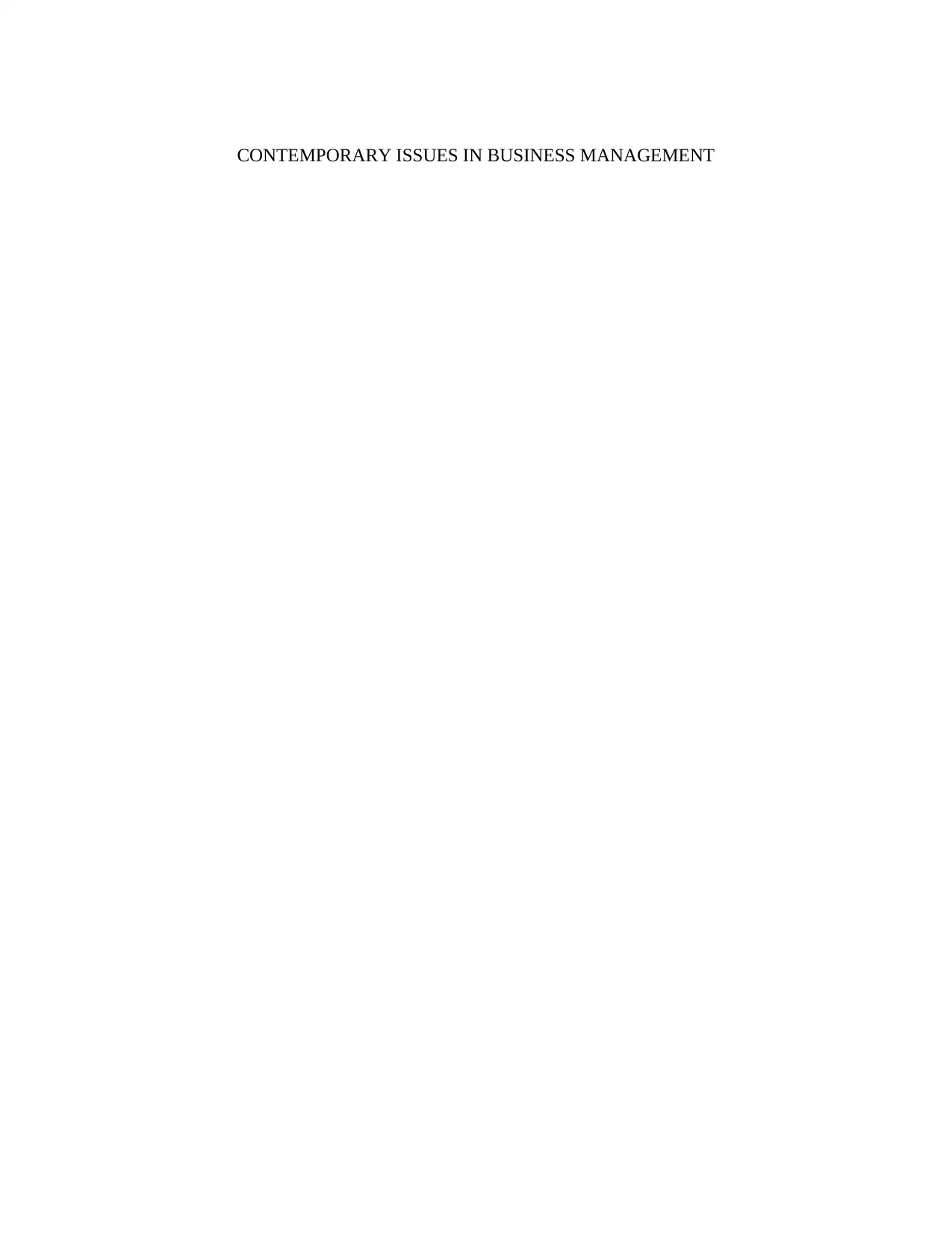
CONTEMPORARY ISSUES IN BUSINESS MANAGEMENT
Paraphrase This Document
Need a fresh take? Get an instant paraphrase of this document with our AI Paraphraser
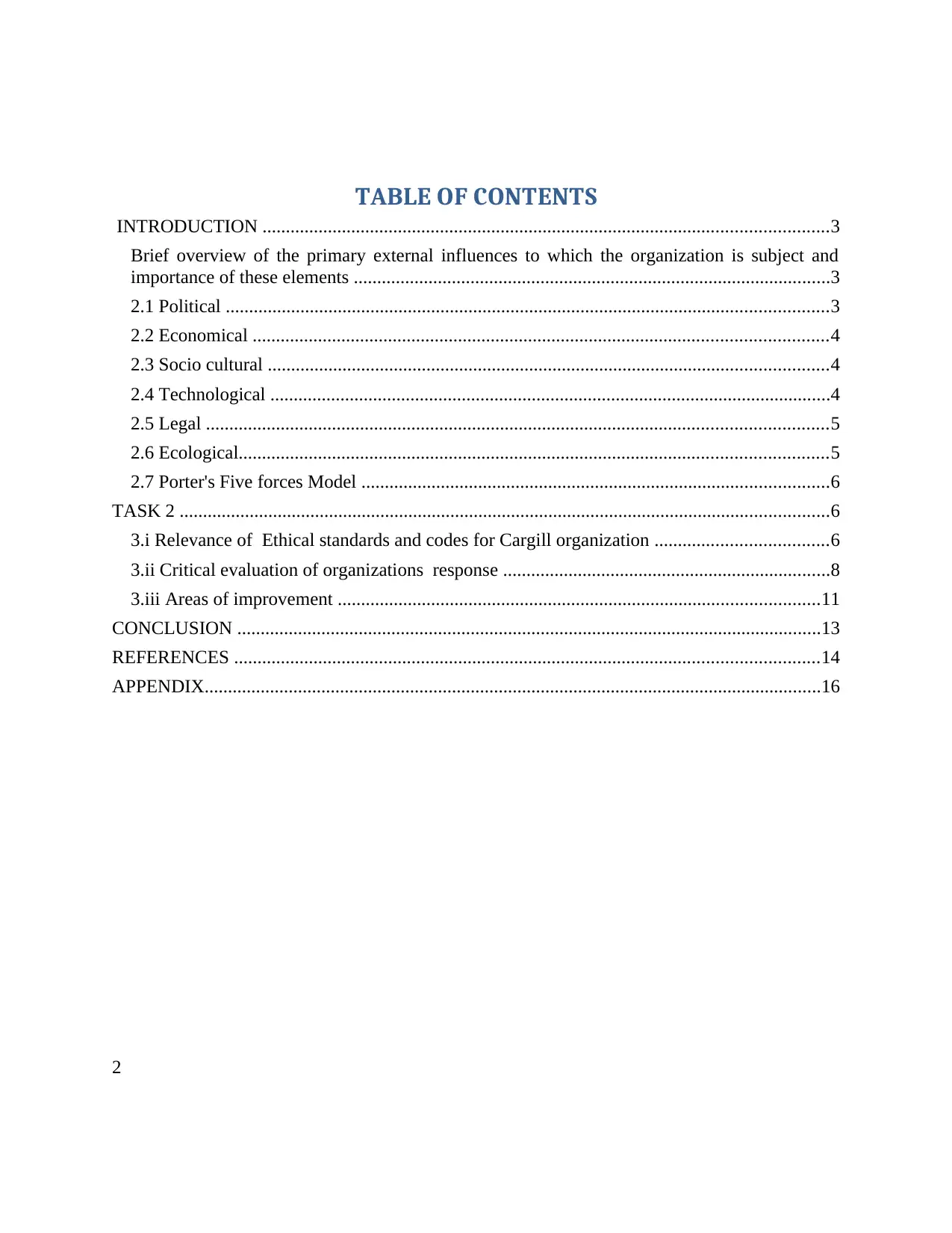
TABLE OF CONTENTS
INTRODUCTION .........................................................................................................................3
Brief overview of the primary external influences to which the organization is subject and
importance of these elements ......................................................................................................3
2.1 Political .................................................................................................................................3
2.2 Economical ...........................................................................................................................4
2.3 Socio cultural ........................................................................................................................4
2.4 Technological ........................................................................................................................4
2.5 Legal .....................................................................................................................................5
2.6 Ecological..............................................................................................................................5
2.7 Porter's Five forces Model ....................................................................................................6
TASK 2 ...........................................................................................................................................6
3.i Relevance of Ethical standards and codes for Cargill organization .....................................6
3.ii Critical evaluation of organizations response ......................................................................8
3.iii Areas of improvement .......................................................................................................11
CONCLUSION .............................................................................................................................13
REFERENCES .............................................................................................................................14
APPENDIX....................................................................................................................................16
2
INTRODUCTION .........................................................................................................................3
Brief overview of the primary external influences to which the organization is subject and
importance of these elements ......................................................................................................3
2.1 Political .................................................................................................................................3
2.2 Economical ...........................................................................................................................4
2.3 Socio cultural ........................................................................................................................4
2.4 Technological ........................................................................................................................4
2.5 Legal .....................................................................................................................................5
2.6 Ecological..............................................................................................................................5
2.7 Porter's Five forces Model ....................................................................................................6
TASK 2 ...........................................................................................................................................6
3.i Relevance of Ethical standards and codes for Cargill organization .....................................6
3.ii Critical evaluation of organizations response ......................................................................8
3.iii Areas of improvement .......................................................................................................11
CONCLUSION .............................................................................................................................13
REFERENCES .............................................................................................................................14
APPENDIX....................................................................................................................................16
2
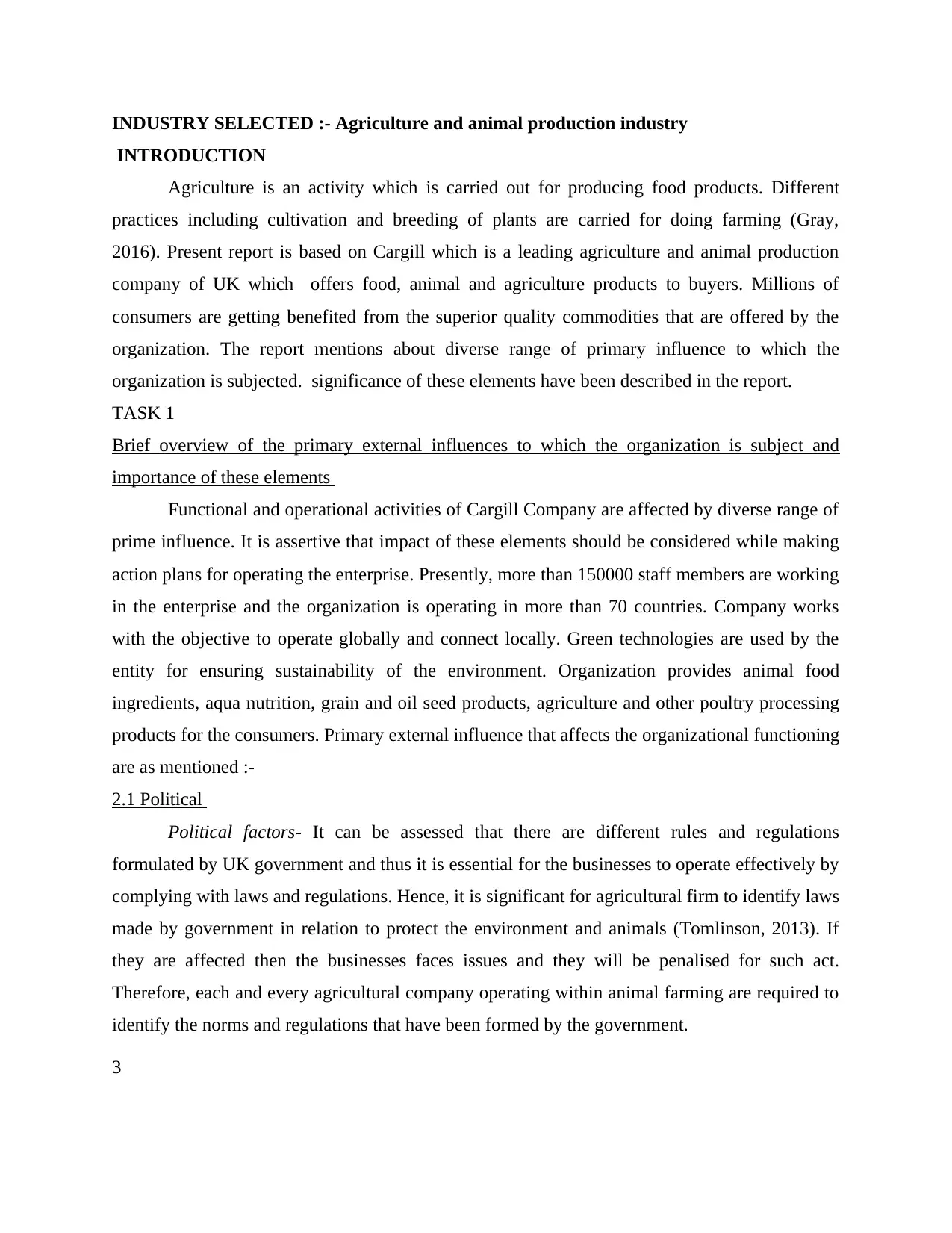
INDUSTRY SELECTED :- Agriculture and animal production industry
INTRODUCTION
Agriculture is an activity which is carried out for producing food products. Different
practices including cultivation and breeding of plants are carried for doing farming (Gray,
2016). Present report is based on Cargill which is a leading agriculture and animal production
company of UK which offers food, animal and agriculture products to buyers. Millions of
consumers are getting benefited from the superior quality commodities that are offered by the
organization. The report mentions about diverse range of primary influence to which the
organization is subjected. significance of these elements have been described in the report.
TASK 1
Brief overview of the primary external influences to which the organization is subject and
importance of these elements
Functional and operational activities of Cargill Company are affected by diverse range of
prime influence. It is assertive that impact of these elements should be considered while making
action plans for operating the enterprise. Presently, more than 150000 staff members are working
in the enterprise and the organization is operating in more than 70 countries. Company works
with the objective to operate globally and connect locally. Green technologies are used by the
entity for ensuring sustainability of the environment. Organization provides animal food
ingredients, aqua nutrition, grain and oil seed products, agriculture and other poultry processing
products for the consumers. Primary external influence that affects the organizational functioning
are as mentioned :-
2.1 Political
Political factors- It can be assessed that there are different rules and regulations
formulated by UK government and thus it is essential for the businesses to operate effectively by
complying with laws and regulations. Hence, it is significant for agricultural firm to identify laws
made by government in relation to protect the environment and animals (Tomlinson, 2013). If
they are affected then the businesses faces issues and they will be penalised for such act.
Therefore, each and every agricultural company operating within animal farming are required to
identify the norms and regulations that have been formed by the government.
3
INTRODUCTION
Agriculture is an activity which is carried out for producing food products. Different
practices including cultivation and breeding of plants are carried for doing farming (Gray,
2016). Present report is based on Cargill which is a leading agriculture and animal production
company of UK which offers food, animal and agriculture products to buyers. Millions of
consumers are getting benefited from the superior quality commodities that are offered by the
organization. The report mentions about diverse range of primary influence to which the
organization is subjected. significance of these elements have been described in the report.
TASK 1
Brief overview of the primary external influences to which the organization is subject and
importance of these elements
Functional and operational activities of Cargill Company are affected by diverse range of
prime influence. It is assertive that impact of these elements should be considered while making
action plans for operating the enterprise. Presently, more than 150000 staff members are working
in the enterprise and the organization is operating in more than 70 countries. Company works
with the objective to operate globally and connect locally. Green technologies are used by the
entity for ensuring sustainability of the environment. Organization provides animal food
ingredients, aqua nutrition, grain and oil seed products, agriculture and other poultry processing
products for the consumers. Primary external influence that affects the organizational functioning
are as mentioned :-
2.1 Political
Political factors- It can be assessed that there are different rules and regulations
formulated by UK government and thus it is essential for the businesses to operate effectively by
complying with laws and regulations. Hence, it is significant for agricultural firm to identify laws
made by government in relation to protect the environment and animals (Tomlinson, 2013). If
they are affected then the businesses faces issues and they will be penalised for such act.
Therefore, each and every agricultural company operating within animal farming are required to
identify the norms and regulations that have been formed by the government.
3
⊘ This is a preview!⊘
Do you want full access?
Subscribe today to unlock all pages.

Trusted by 1+ million students worldwide
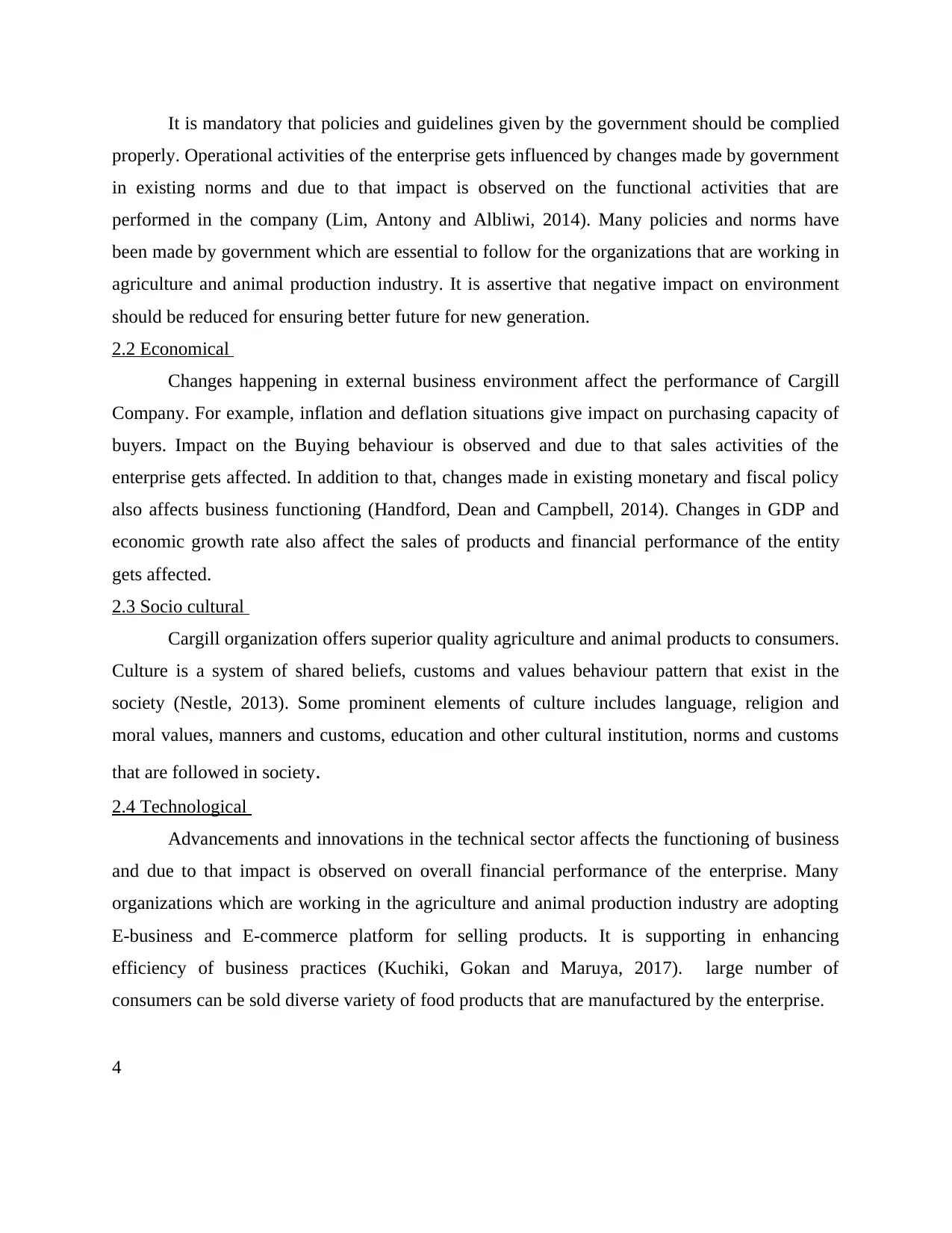
It is mandatory that policies and guidelines given by the government should be complied
properly. Operational activities of the enterprise gets influenced by changes made by government
in existing norms and due to that impact is observed on the functional activities that are
performed in the company (Lim, Antony and Albliwi, 2014). Many policies and norms have
been made by government which are essential to follow for the organizations that are working in
agriculture and animal production industry. It is assertive that negative impact on environment
should be reduced for ensuring better future for new generation.
2.2 Economical
Changes happening in external business environment affect the performance of Cargill
Company. For example, inflation and deflation situations give impact on purchasing capacity of
buyers. Impact on the Buying behaviour is observed and due to that sales activities of the
enterprise gets affected. In addition to that, changes made in existing monetary and fiscal policy
also affects business functioning (Handford, Dean and Campbell, 2014). Changes in GDP and
economic growth rate also affect the sales of products and financial performance of the entity
gets affected.
2.3 Socio cultural
Cargill organization offers superior quality agriculture and animal products to consumers.
Culture is a system of shared beliefs, customs and values behaviour pattern that exist in the
society (Nestle, 2013). Some prominent elements of culture includes language, religion and
moral values, manners and customs, education and other cultural institution, norms and customs
that are followed in society.
2.4 Technological
Advancements and innovations in the technical sector affects the functioning of business
and due to that impact is observed on overall financial performance of the enterprise. Many
organizations which are working in the agriculture and animal production industry are adopting
E-business and E-commerce platform for selling products. It is supporting in enhancing
efficiency of business practices (Kuchiki, Gokan and Maruya, 2017). large number of
consumers can be sold diverse variety of food products that are manufactured by the enterprise.
4
properly. Operational activities of the enterprise gets influenced by changes made by government
in existing norms and due to that impact is observed on the functional activities that are
performed in the company (Lim, Antony and Albliwi, 2014). Many policies and norms have
been made by government which are essential to follow for the organizations that are working in
agriculture and animal production industry. It is assertive that negative impact on environment
should be reduced for ensuring better future for new generation.
2.2 Economical
Changes happening in external business environment affect the performance of Cargill
Company. For example, inflation and deflation situations give impact on purchasing capacity of
buyers. Impact on the Buying behaviour is observed and due to that sales activities of the
enterprise gets affected. In addition to that, changes made in existing monetary and fiscal policy
also affects business functioning (Handford, Dean and Campbell, 2014). Changes in GDP and
economic growth rate also affect the sales of products and financial performance of the entity
gets affected.
2.3 Socio cultural
Cargill organization offers superior quality agriculture and animal products to consumers.
Culture is a system of shared beliefs, customs and values behaviour pattern that exist in the
society (Nestle, 2013). Some prominent elements of culture includes language, religion and
moral values, manners and customs, education and other cultural institution, norms and customs
that are followed in society.
2.4 Technological
Advancements and innovations in the technical sector affects the functioning of business
and due to that impact is observed on overall financial performance of the enterprise. Many
organizations which are working in the agriculture and animal production industry are adopting
E-business and E-commerce platform for selling products. It is supporting in enhancing
efficiency of business practices (Kuchiki, Gokan and Maruya, 2017). large number of
consumers can be sold diverse variety of food products that are manufactured by the enterprise.
4
Paraphrase This Document
Need a fresh take? Get an instant paraphrase of this document with our AI Paraphraser
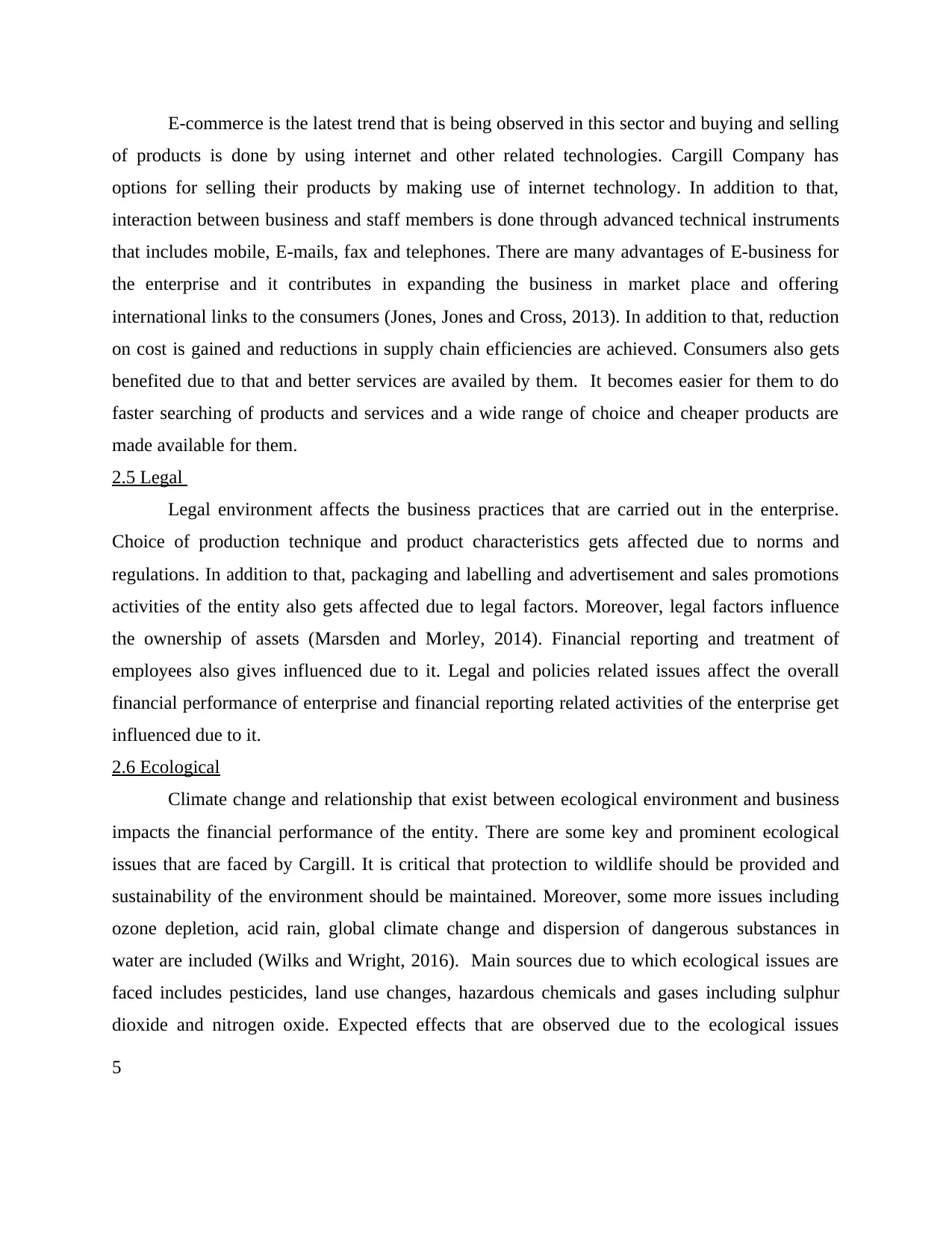
E-commerce is the latest trend that is being observed in this sector and buying and selling
of products is done by using internet and other related technologies. Cargill Company has
options for selling their products by making use of internet technology. In addition to that,
interaction between business and staff members is done through advanced technical instruments
that includes mobile, E-mails, fax and telephones. There are many advantages of E-business for
the enterprise and it contributes in expanding the business in market place and offering
international links to the consumers (Jones, Jones and Cross, 2013). In addition to that, reduction
on cost is gained and reductions in supply chain efficiencies are achieved. Consumers also gets
benefited due to that and better services are availed by them. It becomes easier for them to do
faster searching of products and services and a wide range of choice and cheaper products are
made available for them.
2.5 Legal
Legal environment affects the business practices that are carried out in the enterprise.
Choice of production technique and product characteristics gets affected due to norms and
regulations. In addition to that, packaging and labelling and advertisement and sales promotions
activities of the entity also gets affected due to legal factors. Moreover, legal factors influence
the ownership of assets (Marsden and Morley, 2014). Financial reporting and treatment of
employees also gives influenced due to it. Legal and policies related issues affect the overall
financial performance of enterprise and financial reporting related activities of the enterprise get
influenced due to it.
2.6 Ecological
Climate change and relationship that exist between ecological environment and business
impacts the financial performance of the entity. There are some key and prominent ecological
issues that are faced by Cargill. It is critical that protection to wildlife should be provided and
sustainability of the environment should be maintained. Moreover, some more issues including
ozone depletion, acid rain, global climate change and dispersion of dangerous substances in
water are included (Wilks and Wright, 2016). Main sources due to which ecological issues are
faced includes pesticides, land use changes, hazardous chemicals and gases including sulphur
dioxide and nitrogen oxide. Expected effects that are observed due to the ecological issues
5
of products is done by using internet and other related technologies. Cargill Company has
options for selling their products by making use of internet technology. In addition to that,
interaction between business and staff members is done through advanced technical instruments
that includes mobile, E-mails, fax and telephones. There are many advantages of E-business for
the enterprise and it contributes in expanding the business in market place and offering
international links to the consumers (Jones, Jones and Cross, 2013). In addition to that, reduction
on cost is gained and reductions in supply chain efficiencies are achieved. Consumers also gets
benefited due to that and better services are availed by them. It becomes easier for them to do
faster searching of products and services and a wide range of choice and cheaper products are
made available for them.
2.5 Legal
Legal environment affects the business practices that are carried out in the enterprise.
Choice of production technique and product characteristics gets affected due to norms and
regulations. In addition to that, packaging and labelling and advertisement and sales promotions
activities of the entity also gets affected due to legal factors. Moreover, legal factors influence
the ownership of assets (Marsden and Morley, 2014). Financial reporting and treatment of
employees also gives influenced due to it. Legal and policies related issues affect the overall
financial performance of enterprise and financial reporting related activities of the enterprise get
influenced due to it.
2.6 Ecological
Climate change and relationship that exist between ecological environment and business
impacts the financial performance of the entity. There are some key and prominent ecological
issues that are faced by Cargill. It is critical that protection to wildlife should be provided and
sustainability of the environment should be maintained. Moreover, some more issues including
ozone depletion, acid rain, global climate change and dispersion of dangerous substances in
water are included (Wilks and Wright, 2016). Main sources due to which ecological issues are
faced includes pesticides, land use changes, hazardous chemicals and gases including sulphur
dioxide and nitrogen oxide. Expected effects that are observed due to the ecological issues
5
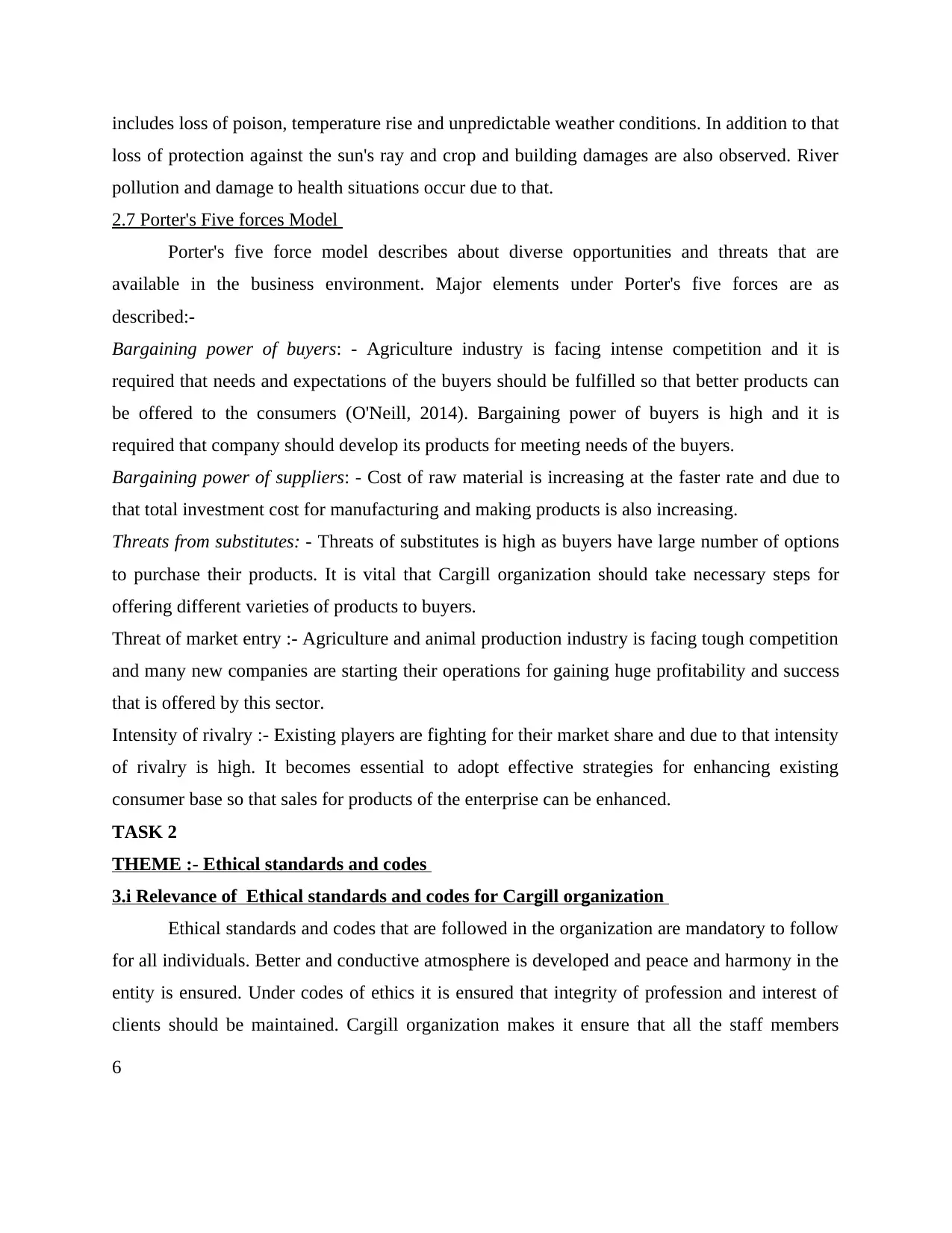
includes loss of poison, temperature rise and unpredictable weather conditions. In addition to that
loss of protection against the sun's ray and crop and building damages are also observed. River
pollution and damage to health situations occur due to that.
2.7 Porter's Five forces Model
Porter's five force model describes about diverse opportunities and threats that are
available in the business environment. Major elements under Porter's five forces are as
described:-
Bargaining power of buyers: - Agriculture industry is facing intense competition and it is
required that needs and expectations of the buyers should be fulfilled so that better products can
be offered to the consumers (O'Neill, 2014). Bargaining power of buyers is high and it is
required that company should develop its products for meeting needs of the buyers.
Bargaining power of suppliers: - Cost of raw material is increasing at the faster rate and due to
that total investment cost for manufacturing and making products is also increasing.
Threats from substitutes: - Threats of substitutes is high as buyers have large number of options
to purchase their products. It is vital that Cargill organization should take necessary steps for
offering different varieties of products to buyers.
Threat of market entry :- Agriculture and animal production industry is facing tough competition
and many new companies are starting their operations for gaining huge profitability and success
that is offered by this sector.
Intensity of rivalry :- Existing players are fighting for their market share and due to that intensity
of rivalry is high. It becomes essential to adopt effective strategies for enhancing existing
consumer base so that sales for products of the enterprise can be enhanced.
TASK 2
THEME :- Ethical standards and codes
3.i Relevance of Ethical standards and codes for Cargill organization
Ethical standards and codes that are followed in the organization are mandatory to follow
for all individuals. Better and conductive atmosphere is developed and peace and harmony in the
entity is ensured. Under codes of ethics it is ensured that integrity of profession and interest of
clients should be maintained. Cargill organization makes it ensure that all the staff members
6
loss of protection against the sun's ray and crop and building damages are also observed. River
pollution and damage to health situations occur due to that.
2.7 Porter's Five forces Model
Porter's five force model describes about diverse opportunities and threats that are
available in the business environment. Major elements under Porter's five forces are as
described:-
Bargaining power of buyers: - Agriculture industry is facing intense competition and it is
required that needs and expectations of the buyers should be fulfilled so that better products can
be offered to the consumers (O'Neill, 2014). Bargaining power of buyers is high and it is
required that company should develop its products for meeting needs of the buyers.
Bargaining power of suppliers: - Cost of raw material is increasing at the faster rate and due to
that total investment cost for manufacturing and making products is also increasing.
Threats from substitutes: - Threats of substitutes is high as buyers have large number of options
to purchase their products. It is vital that Cargill organization should take necessary steps for
offering different varieties of products to buyers.
Threat of market entry :- Agriculture and animal production industry is facing tough competition
and many new companies are starting their operations for gaining huge profitability and success
that is offered by this sector.
Intensity of rivalry :- Existing players are fighting for their market share and due to that intensity
of rivalry is high. It becomes essential to adopt effective strategies for enhancing existing
consumer base so that sales for products of the enterprise can be enhanced.
TASK 2
THEME :- Ethical standards and codes
3.i Relevance of Ethical standards and codes for Cargill organization
Ethical standards and codes that are followed in the organization are mandatory to follow
for all individuals. Better and conductive atmosphere is developed and peace and harmony in the
entity is ensured. Under codes of ethics it is ensured that integrity of profession and interest of
clients should be maintained. Cargill organization makes it ensure that all the staff members
6
⊘ This is a preview!⊘
Do you want full access?
Subscribe today to unlock all pages.

Trusted by 1+ million students worldwide
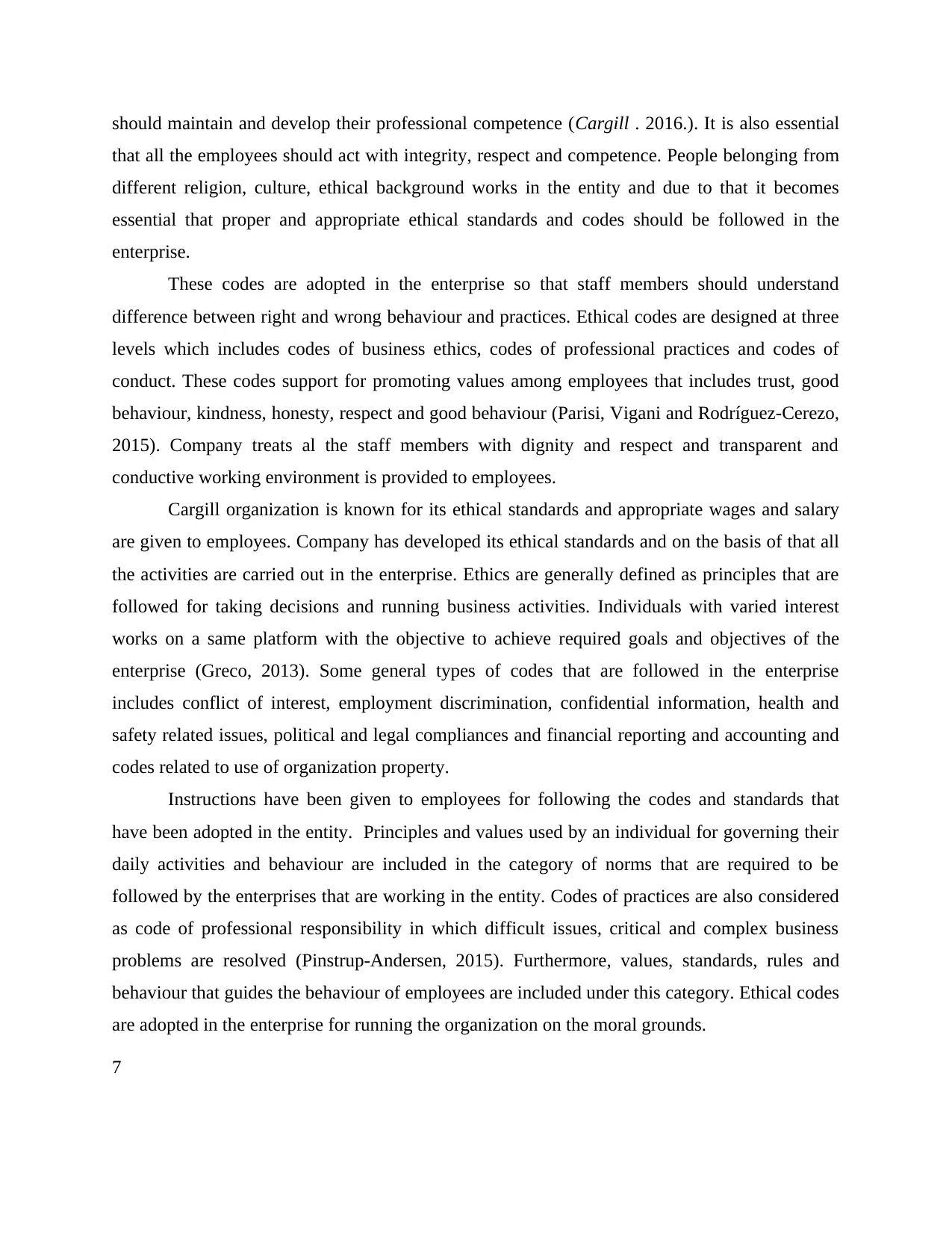
should maintain and develop their professional competence (Cargill . 2016.). It is also essential
that all the employees should act with integrity, respect and competence. People belonging from
different religion, culture, ethical background works in the entity and due to that it becomes
essential that proper and appropriate ethical standards and codes should be followed in the
enterprise.
These codes are adopted in the enterprise so that staff members should understand
difference between right and wrong behaviour and practices. Ethical codes are designed at three
levels which includes codes of business ethics, codes of professional practices and codes of
conduct. These codes support for promoting values among employees that includes trust, good
behaviour, kindness, honesty, respect and good behaviour (Parisi, Vigani and Rodríguez-Cerezo,
2015). Company treats al the staff members with dignity and respect and transparent and
conductive working environment is provided to employees.
Cargill organization is known for its ethical standards and appropriate wages and salary
are given to employees. Company has developed its ethical standards and on the basis of that all
the activities are carried out in the enterprise. Ethics are generally defined as principles that are
followed for taking decisions and running business activities. Individuals with varied interest
works on a same platform with the objective to achieve required goals and objectives of the
enterprise (Greco, 2013). Some general types of codes that are followed in the enterprise
includes conflict of interest, employment discrimination, confidential information, health and
safety related issues, political and legal compliances and financial reporting and accounting and
codes related to use of organization property.
Instructions have been given to employees for following the codes and standards that
have been adopted in the entity. Principles and values used by an individual for governing their
daily activities and behaviour are included in the category of norms that are required to be
followed by the enterprises that are working in the entity. Codes of practices are also considered
as code of professional responsibility in which difficult issues, critical and complex business
problems are resolved (Pinstrup-Andersen, 2015). Furthermore, values, standards, rules and
behaviour that guides the behaviour of employees are included under this category. Ethical codes
are adopted in the enterprise for running the organization on the moral grounds.
7
that all the employees should act with integrity, respect and competence. People belonging from
different religion, culture, ethical background works in the entity and due to that it becomes
essential that proper and appropriate ethical standards and codes should be followed in the
enterprise.
These codes are adopted in the enterprise so that staff members should understand
difference between right and wrong behaviour and practices. Ethical codes are designed at three
levels which includes codes of business ethics, codes of professional practices and codes of
conduct. These codes support for promoting values among employees that includes trust, good
behaviour, kindness, honesty, respect and good behaviour (Parisi, Vigani and Rodríguez-Cerezo,
2015). Company treats al the staff members with dignity and respect and transparent and
conductive working environment is provided to employees.
Cargill organization is known for its ethical standards and appropriate wages and salary
are given to employees. Company has developed its ethical standards and on the basis of that all
the activities are carried out in the enterprise. Ethics are generally defined as principles that are
followed for taking decisions and running business activities. Individuals with varied interest
works on a same platform with the objective to achieve required goals and objectives of the
enterprise (Greco, 2013). Some general types of codes that are followed in the enterprise
includes conflict of interest, employment discrimination, confidential information, health and
safety related issues, political and legal compliances and financial reporting and accounting and
codes related to use of organization property.
Instructions have been given to employees for following the codes and standards that
have been adopted in the entity. Principles and values used by an individual for governing their
daily activities and behaviour are included in the category of norms that are required to be
followed by the enterprises that are working in the entity. Codes of practices are also considered
as code of professional responsibility in which difficult issues, critical and complex business
problems are resolved (Pinstrup-Andersen, 2015). Furthermore, values, standards, rules and
behaviour that guides the behaviour of employees are included under this category. Ethical codes
are adopted in the enterprise for running the organization on the moral grounds.
7
Paraphrase This Document
Need a fresh take? Get an instant paraphrase of this document with our AI Paraphraser
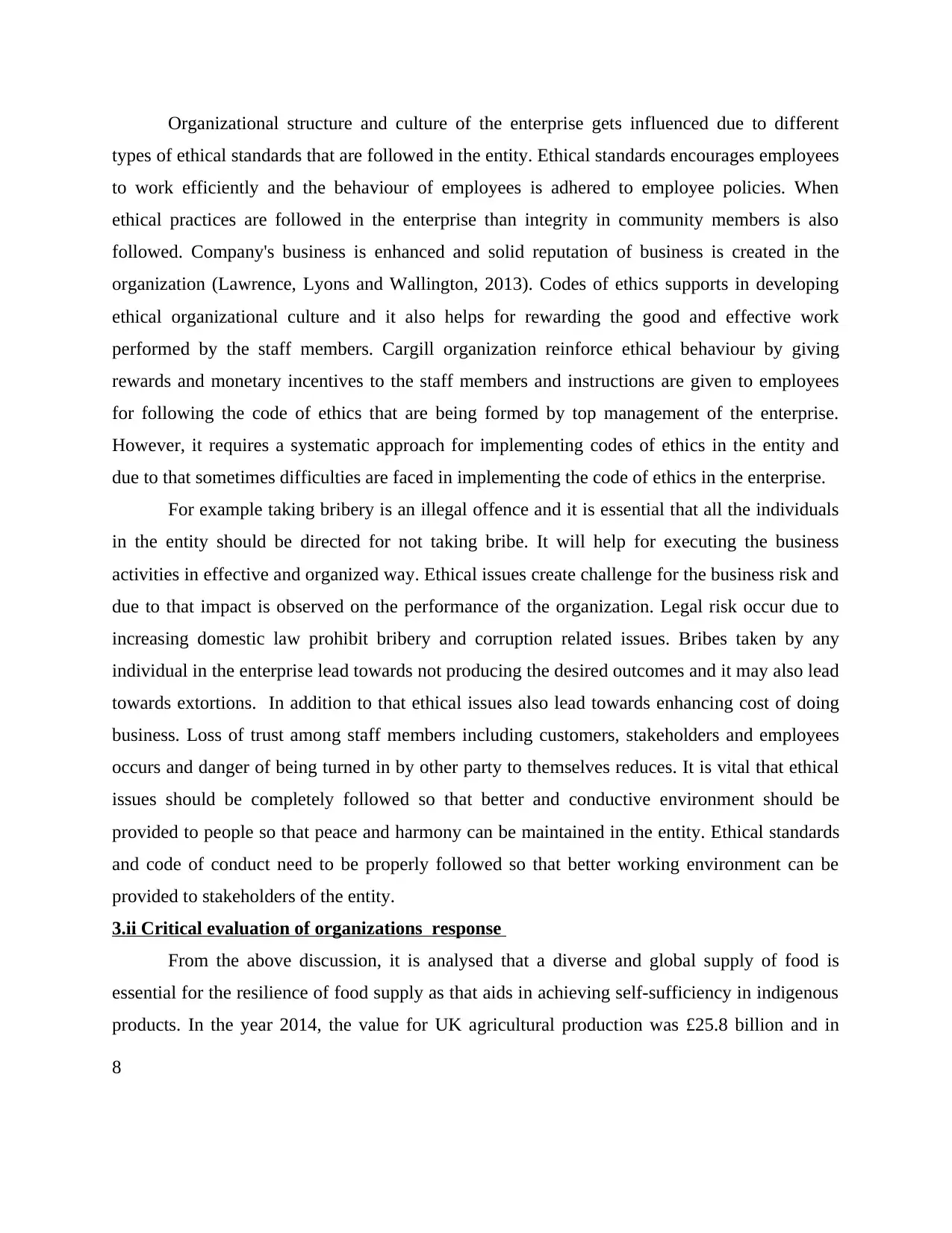
Organizational structure and culture of the enterprise gets influenced due to different
types of ethical standards that are followed in the entity. Ethical standards encourages employees
to work efficiently and the behaviour of employees is adhered to employee policies. When
ethical practices are followed in the enterprise than integrity in community members is also
followed. Company's business is enhanced and solid reputation of business is created in the
organization (Lawrence, Lyons and Wallington, 2013). Codes of ethics supports in developing
ethical organizational culture and it also helps for rewarding the good and effective work
performed by the staff members. Cargill organization reinforce ethical behaviour by giving
rewards and monetary incentives to the staff members and instructions are given to employees
for following the code of ethics that are being formed by top management of the enterprise.
However, it requires a systematic approach for implementing codes of ethics in the entity and
due to that sometimes difficulties are faced in implementing the code of ethics in the enterprise.
For example taking bribery is an illegal offence and it is essential that all the individuals
in the entity should be directed for not taking bribe. It will help for executing the business
activities in effective and organized way. Ethical issues create challenge for the business risk and
due to that impact is observed on the performance of the organization. Legal risk occur due to
increasing domestic law prohibit bribery and corruption related issues. Bribes taken by any
individual in the enterprise lead towards not producing the desired outcomes and it may also lead
towards extortions. In addition to that ethical issues also lead towards enhancing cost of doing
business. Loss of trust among staff members including customers, stakeholders and employees
occurs and danger of being turned in by other party to themselves reduces. It is vital that ethical
issues should be completely followed so that better and conductive environment should be
provided to people so that peace and harmony can be maintained in the entity. Ethical standards
and code of conduct need to be properly followed so that better working environment can be
provided to stakeholders of the entity.
3.ii Critical evaluation of organizations response
From the above discussion, it is analysed that a diverse and global supply of food is
essential for the resilience of food supply as that aids in achieving self-sufficiency in indigenous
products. In the year 2014, the value for UK agricultural production was £25.8 billion and in
8
types of ethical standards that are followed in the entity. Ethical standards encourages employees
to work efficiently and the behaviour of employees is adhered to employee policies. When
ethical practices are followed in the enterprise than integrity in community members is also
followed. Company's business is enhanced and solid reputation of business is created in the
organization (Lawrence, Lyons and Wallington, 2013). Codes of ethics supports in developing
ethical organizational culture and it also helps for rewarding the good and effective work
performed by the staff members. Cargill organization reinforce ethical behaviour by giving
rewards and monetary incentives to the staff members and instructions are given to employees
for following the code of ethics that are being formed by top management of the enterprise.
However, it requires a systematic approach for implementing codes of ethics in the entity and
due to that sometimes difficulties are faced in implementing the code of ethics in the enterprise.
For example taking bribery is an illegal offence and it is essential that all the individuals
in the entity should be directed for not taking bribe. It will help for executing the business
activities in effective and organized way. Ethical issues create challenge for the business risk and
due to that impact is observed on the performance of the organization. Legal risk occur due to
increasing domestic law prohibit bribery and corruption related issues. Bribes taken by any
individual in the enterprise lead towards not producing the desired outcomes and it may also lead
towards extortions. In addition to that ethical issues also lead towards enhancing cost of doing
business. Loss of trust among staff members including customers, stakeholders and employees
occurs and danger of being turned in by other party to themselves reduces. It is vital that ethical
issues should be completely followed so that better and conductive environment should be
provided to people so that peace and harmony can be maintained in the entity. Ethical standards
and code of conduct need to be properly followed so that better working environment can be
provided to stakeholders of the entity.
3.ii Critical evaluation of organizations response
From the above discussion, it is analysed that a diverse and global supply of food is
essential for the resilience of food supply as that aids in achieving self-sufficiency in indigenous
products. In the year 2014, the value for UK agricultural production was £25.8 billion and in
8
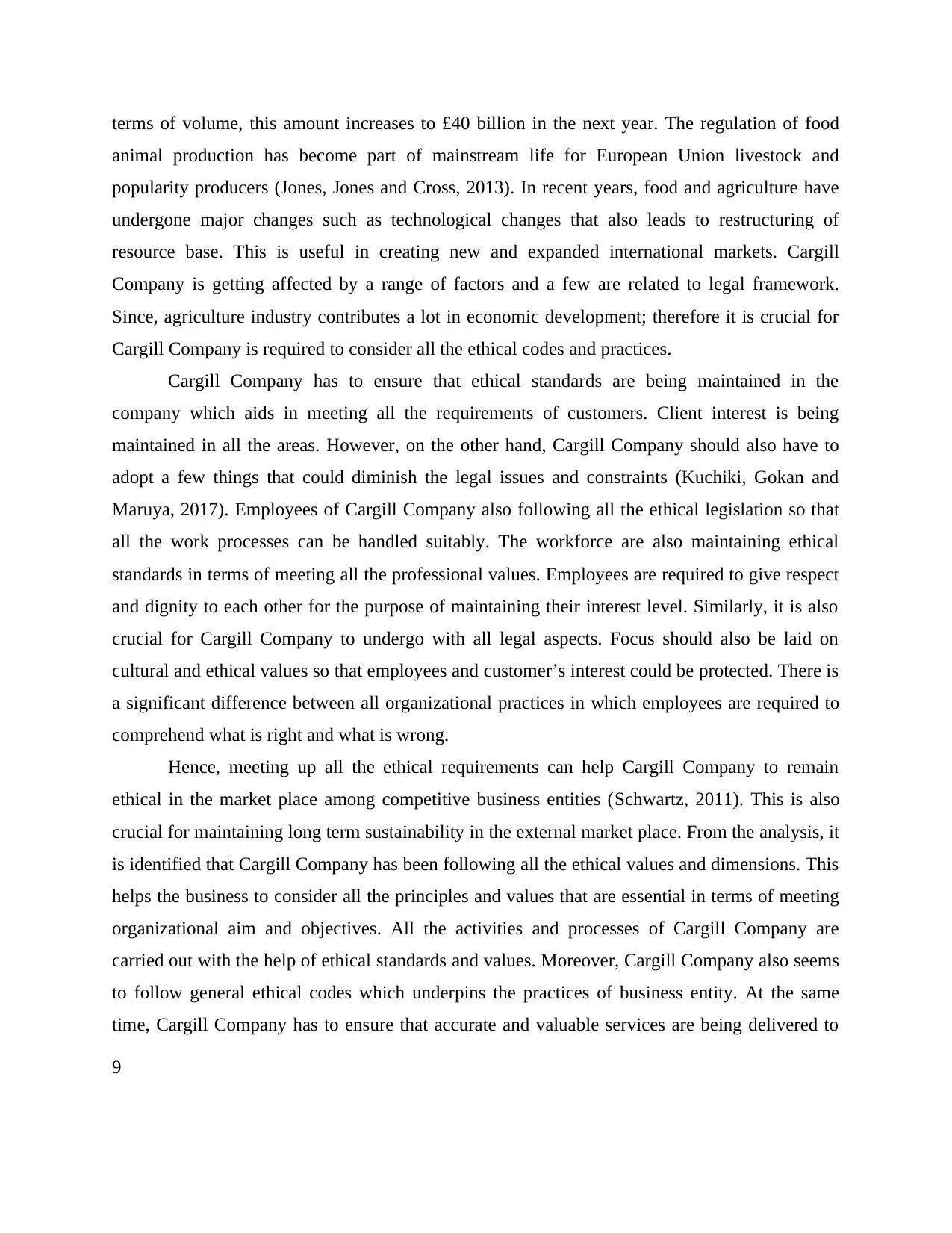
terms of volume, this amount increases to £40 billion in the next year. The regulation of food
animal production has become part of mainstream life for European Union livestock and
popularity producers (Jones, Jones and Cross, 2013). In recent years, food and agriculture have
undergone major changes such as technological changes that also leads to restructuring of
resource base. This is useful in creating new and expanded international markets. Cargill
Company is getting affected by a range of factors and a few are related to legal framework.
Since, agriculture industry contributes a lot in economic development; therefore it is crucial for
Cargill Company is required to consider all the ethical codes and practices.
Cargill Company has to ensure that ethical standards are being maintained in the
company which aids in meeting all the requirements of customers. Client interest is being
maintained in all the areas. However, on the other hand, Cargill Company should also have to
adopt a few things that could diminish the legal issues and constraints (Kuchiki, Gokan and
Maruya, 2017). Employees of Cargill Company also following all the ethical legislation so that
all the work processes can be handled suitably. The workforce are also maintaining ethical
standards in terms of meeting all the professional values. Employees are required to give respect
and dignity to each other for the purpose of maintaining their interest level. Similarly, it is also
crucial for Cargill Company to undergo with all legal aspects. Focus should also be laid on
cultural and ethical values so that employees and customer’s interest could be protected. There is
a significant difference between all organizational practices in which employees are required to
comprehend what is right and what is wrong.
Hence, meeting up all the ethical requirements can help Cargill Company to remain
ethical in the market place among competitive business entities (Schwartz, 2011). This is also
crucial for maintaining long term sustainability in the external market place. From the analysis, it
is identified that Cargill Company has been following all the ethical values and dimensions. This
helps the business to consider all the principles and values that are essential in terms of meeting
organizational aim and objectives. All the activities and processes of Cargill Company are
carried out with the help of ethical standards and values. Moreover, Cargill Company also seems
to follow general ethical codes which underpins the practices of business entity. At the same
time, Cargill Company has to ensure that accurate and valuable services are being delivered to
9
animal production has become part of mainstream life for European Union livestock and
popularity producers (Jones, Jones and Cross, 2013). In recent years, food and agriculture have
undergone major changes such as technological changes that also leads to restructuring of
resource base. This is useful in creating new and expanded international markets. Cargill
Company is getting affected by a range of factors and a few are related to legal framework.
Since, agriculture industry contributes a lot in economic development; therefore it is crucial for
Cargill Company is required to consider all the ethical codes and practices.
Cargill Company has to ensure that ethical standards are being maintained in the
company which aids in meeting all the requirements of customers. Client interest is being
maintained in all the areas. However, on the other hand, Cargill Company should also have to
adopt a few things that could diminish the legal issues and constraints (Kuchiki, Gokan and
Maruya, 2017). Employees of Cargill Company also following all the ethical legislation so that
all the work processes can be handled suitably. The workforce are also maintaining ethical
standards in terms of meeting all the professional values. Employees are required to give respect
and dignity to each other for the purpose of maintaining their interest level. Similarly, it is also
crucial for Cargill Company to undergo with all legal aspects. Focus should also be laid on
cultural and ethical values so that employees and customer’s interest could be protected. There is
a significant difference between all organizational practices in which employees are required to
comprehend what is right and what is wrong.
Hence, meeting up all the ethical requirements can help Cargill Company to remain
ethical in the market place among competitive business entities (Schwartz, 2011). This is also
crucial for maintaining long term sustainability in the external market place. From the analysis, it
is identified that Cargill Company has been following all the ethical values and dimensions. This
helps the business to consider all the principles and values that are essential in terms of meeting
organizational aim and objectives. All the activities and processes of Cargill Company are
carried out with the help of ethical standards and values. Moreover, Cargill Company also seems
to follow general ethical codes which underpins the practices of business entity. At the same
time, Cargill Company has to ensure that accurate and valuable services are being delivered to
9
⊘ This is a preview!⊘
Do you want full access?
Subscribe today to unlock all pages.

Trusted by 1+ million students worldwide
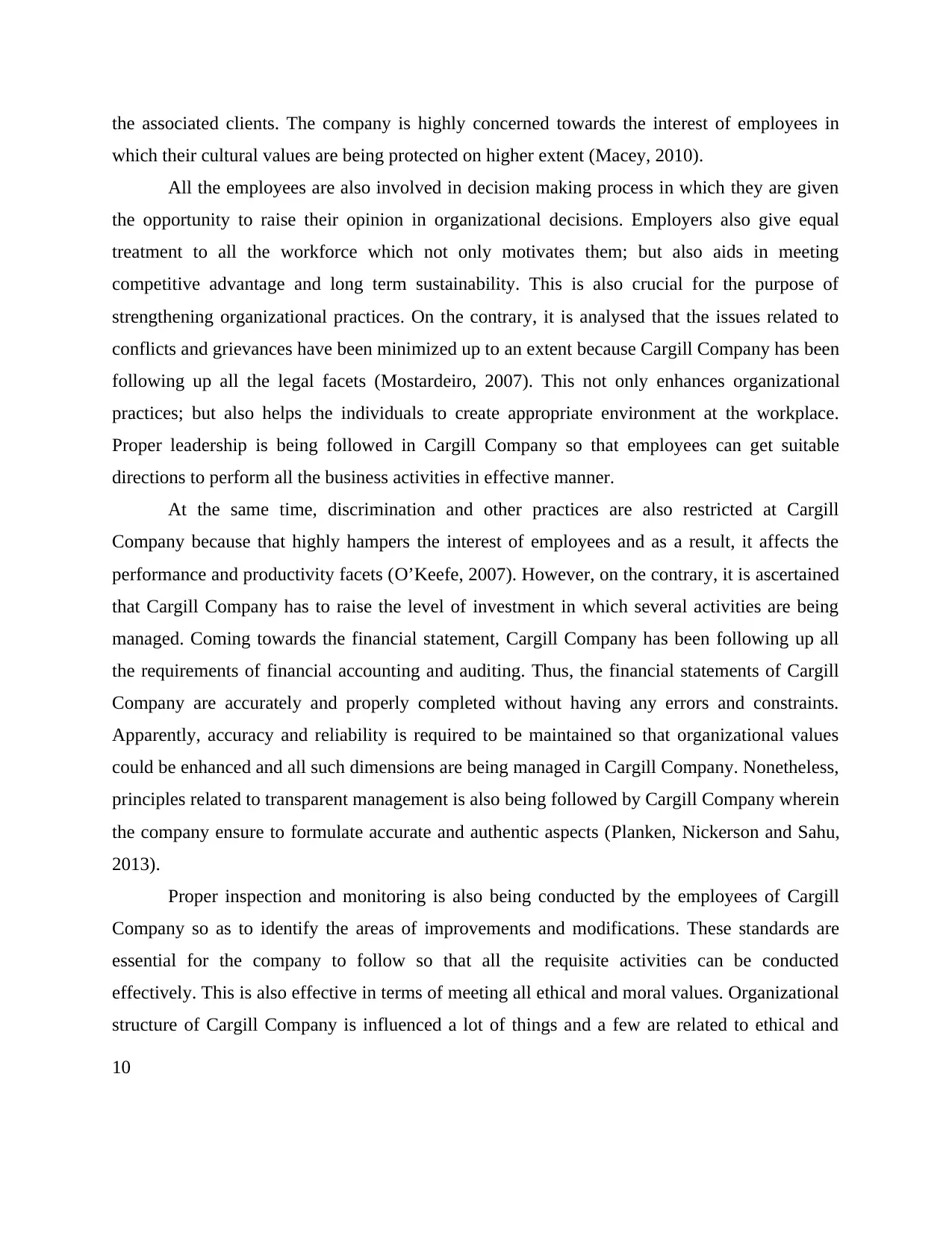
the associated clients. The company is highly concerned towards the interest of employees in
which their cultural values are being protected on higher extent (Macey, 2010).
All the employees are also involved in decision making process in which they are given
the opportunity to raise their opinion in organizational decisions. Employers also give equal
treatment to all the workforce which not only motivates them; but also aids in meeting
competitive advantage and long term sustainability. This is also crucial for the purpose of
strengthening organizational practices. On the contrary, it is analysed that the issues related to
conflicts and grievances have been minimized up to an extent because Cargill Company has been
following up all the legal facets (Mostardeiro, 2007). This not only enhances organizational
practices; but also helps the individuals to create appropriate environment at the workplace.
Proper leadership is being followed in Cargill Company so that employees can get suitable
directions to perform all the business activities in effective manner.
At the same time, discrimination and other practices are also restricted at Cargill
Company because that highly hampers the interest of employees and as a result, it affects the
performance and productivity facets (O’Keefe, 2007). However, on the contrary, it is ascertained
that Cargill Company has to raise the level of investment in which several activities are being
managed. Coming towards the financial statement, Cargill Company has been following up all
the requirements of financial accounting and auditing. Thus, the financial statements of Cargill
Company are accurately and properly completed without having any errors and constraints.
Apparently, accuracy and reliability is required to be maintained so that organizational values
could be enhanced and all such dimensions are being managed in Cargill Company. Nonetheless,
principles related to transparent management is also being followed by Cargill Company wherein
the company ensure to formulate accurate and authentic aspects (Planken, Nickerson and Sahu,
2013).
Proper inspection and monitoring is also being conducted by the employees of Cargill
Company so as to identify the areas of improvements and modifications. These standards are
essential for the company to follow so that all the requisite activities can be conducted
effectively. This is also effective in terms of meeting all ethical and moral values. Organizational
structure of Cargill Company is influenced a lot of things and a few are related to ethical and
10
which their cultural values are being protected on higher extent (Macey, 2010).
All the employees are also involved in decision making process in which they are given
the opportunity to raise their opinion in organizational decisions. Employers also give equal
treatment to all the workforce which not only motivates them; but also aids in meeting
competitive advantage and long term sustainability. This is also crucial for the purpose of
strengthening organizational practices. On the contrary, it is analysed that the issues related to
conflicts and grievances have been minimized up to an extent because Cargill Company has been
following up all the legal facets (Mostardeiro, 2007). This not only enhances organizational
practices; but also helps the individuals to create appropriate environment at the workplace.
Proper leadership is being followed in Cargill Company so that employees can get suitable
directions to perform all the business activities in effective manner.
At the same time, discrimination and other practices are also restricted at Cargill
Company because that highly hampers the interest of employees and as a result, it affects the
performance and productivity facets (O’Keefe, 2007). However, on the contrary, it is ascertained
that Cargill Company has to raise the level of investment in which several activities are being
managed. Coming towards the financial statement, Cargill Company has been following up all
the requirements of financial accounting and auditing. Thus, the financial statements of Cargill
Company are accurately and properly completed without having any errors and constraints.
Apparently, accuracy and reliability is required to be maintained so that organizational values
could be enhanced and all such dimensions are being managed in Cargill Company. Nonetheless,
principles related to transparent management is also being followed by Cargill Company wherein
the company ensure to formulate accurate and authentic aspects (Planken, Nickerson and Sahu,
2013).
Proper inspection and monitoring is also being conducted by the employees of Cargill
Company so as to identify the areas of improvements and modifications. These standards are
essential for the company to follow so that all the requisite activities can be conducted
effectively. This is also effective in terms of meeting all ethical and moral values. Organizational
structure of Cargill Company is influenced a lot of things and a few are related to ethical and
10
Paraphrase This Document
Need a fresh take? Get an instant paraphrase of this document with our AI Paraphraser
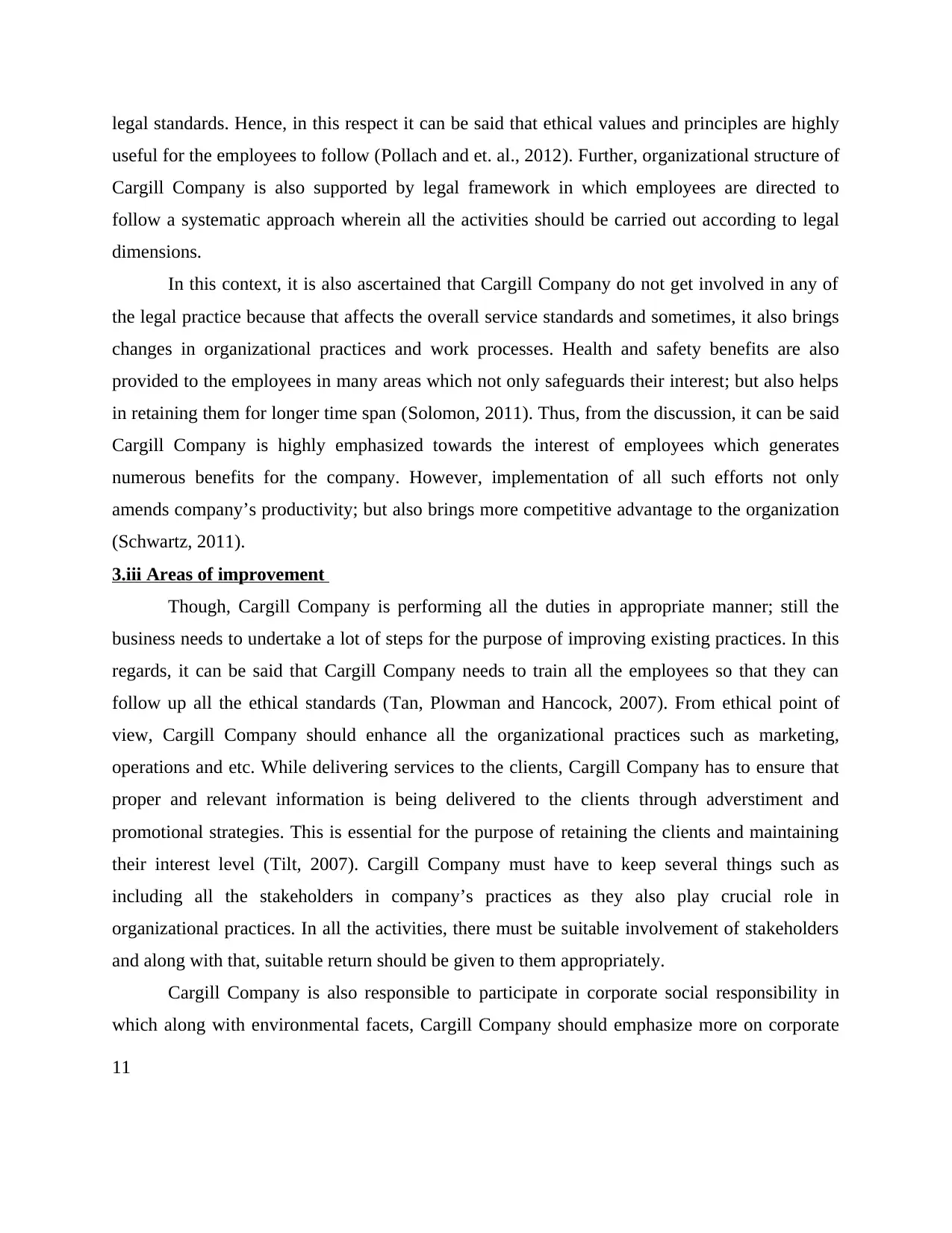
legal standards. Hence, in this respect it can be said that ethical values and principles are highly
useful for the employees to follow (Pollach and et. al., 2012). Further, organizational structure of
Cargill Company is also supported by legal framework in which employees are directed to
follow a systematic approach wherein all the activities should be carried out according to legal
dimensions.
In this context, it is also ascertained that Cargill Company do not get involved in any of
the legal practice because that affects the overall service standards and sometimes, it also brings
changes in organizational practices and work processes. Health and safety benefits are also
provided to the employees in many areas which not only safeguards their interest; but also helps
in retaining them for longer time span (Solomon, 2011). Thus, from the discussion, it can be said
Cargill Company is highly emphasized towards the interest of employees which generates
numerous benefits for the company. However, implementation of all such efforts not only
amends company’s productivity; but also brings more competitive advantage to the organization
(Schwartz, 2011).
3.iii Areas of improvement
Though, Cargill Company is performing all the duties in appropriate manner; still the
business needs to undertake a lot of steps for the purpose of improving existing practices. In this
regards, it can be said that Cargill Company needs to train all the employees so that they can
follow up all the ethical standards (Tan, Plowman and Hancock, 2007). From ethical point of
view, Cargill Company should enhance all the organizational practices such as marketing,
operations and etc. While delivering services to the clients, Cargill Company has to ensure that
proper and relevant information is being delivered to the clients through adverstiment and
promotional strategies. This is essential for the purpose of retaining the clients and maintaining
their interest level (Tilt, 2007). Cargill Company must have to keep several things such as
including all the stakeholders in company’s practices as they also play crucial role in
organizational practices. In all the activities, there must be suitable involvement of stakeholders
and along with that, suitable return should be given to them appropriately.
Cargill Company is also responsible to participate in corporate social responsibility in
which along with environmental facets, Cargill Company should emphasize more on corporate
11
useful for the employees to follow (Pollach and et. al., 2012). Further, organizational structure of
Cargill Company is also supported by legal framework in which employees are directed to
follow a systematic approach wherein all the activities should be carried out according to legal
dimensions.
In this context, it is also ascertained that Cargill Company do not get involved in any of
the legal practice because that affects the overall service standards and sometimes, it also brings
changes in organizational practices and work processes. Health and safety benefits are also
provided to the employees in many areas which not only safeguards their interest; but also helps
in retaining them for longer time span (Solomon, 2011). Thus, from the discussion, it can be said
Cargill Company is highly emphasized towards the interest of employees which generates
numerous benefits for the company. However, implementation of all such efforts not only
amends company’s productivity; but also brings more competitive advantage to the organization
(Schwartz, 2011).
3.iii Areas of improvement
Though, Cargill Company is performing all the duties in appropriate manner; still the
business needs to undertake a lot of steps for the purpose of improving existing practices. In this
regards, it can be said that Cargill Company needs to train all the employees so that they can
follow up all the ethical standards (Tan, Plowman and Hancock, 2007). From ethical point of
view, Cargill Company should enhance all the organizational practices such as marketing,
operations and etc. While delivering services to the clients, Cargill Company has to ensure that
proper and relevant information is being delivered to the clients through adverstiment and
promotional strategies. This is essential for the purpose of retaining the clients and maintaining
their interest level (Tilt, 2007). Cargill Company must have to keep several things such as
including all the stakeholders in company’s practices as they also play crucial role in
organizational practices. In all the activities, there must be suitable involvement of stakeholders
and along with that, suitable return should be given to them appropriately.
Cargill Company is also responsible to participate in corporate social responsibility in
which along with environmental facets, Cargill Company should emphasize more on corporate
11
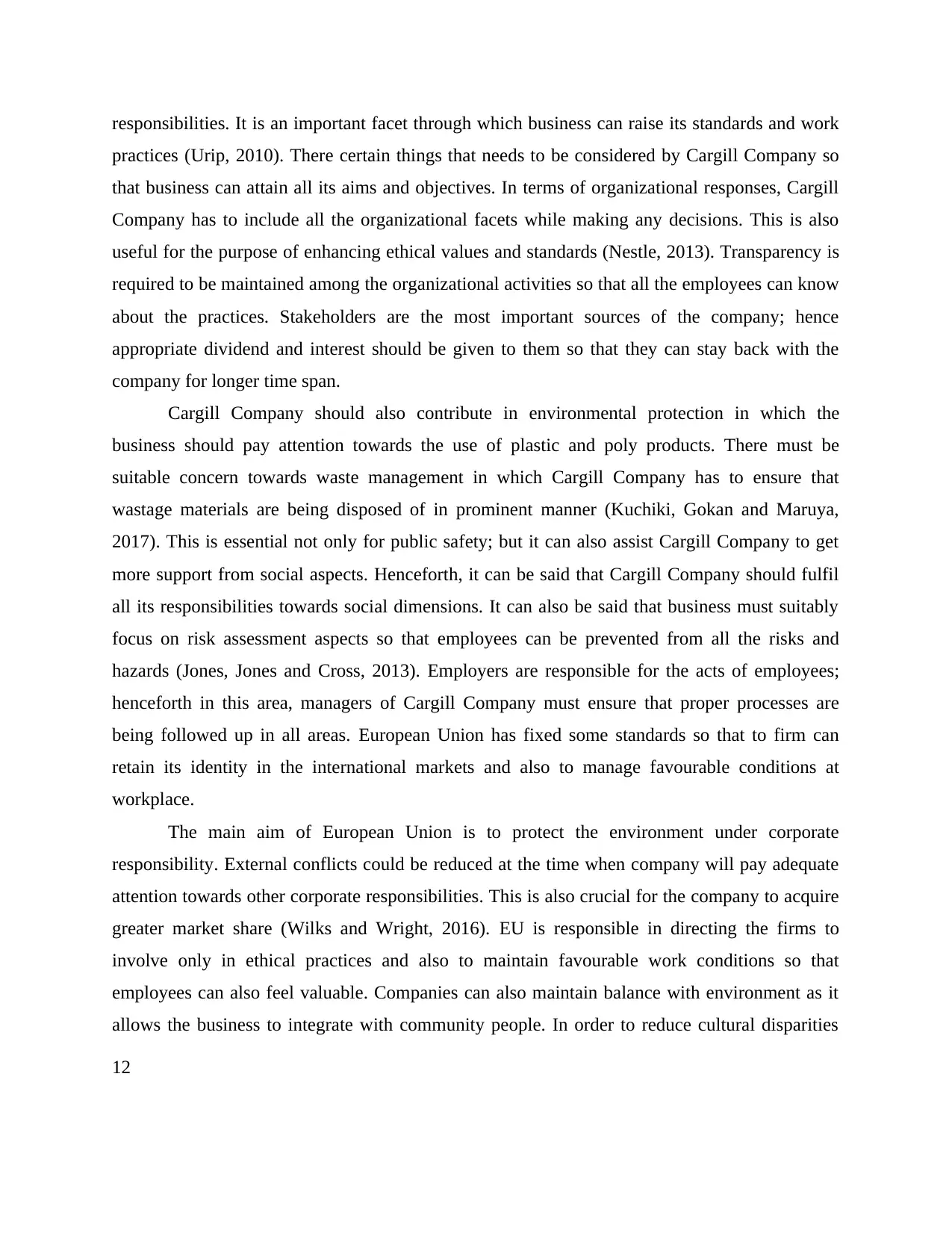
responsibilities. It is an important facet through which business can raise its standards and work
practices (Urip, 2010). There certain things that needs to be considered by Cargill Company so
that business can attain all its aims and objectives. In terms of organizational responses, Cargill
Company has to include all the organizational facets while making any decisions. This is also
useful for the purpose of enhancing ethical values and standards (Nestle, 2013). Transparency is
required to be maintained among the organizational activities so that all the employees can know
about the practices. Stakeholders are the most important sources of the company; hence
appropriate dividend and interest should be given to them so that they can stay back with the
company for longer time span.
Cargill Company should also contribute in environmental protection in which the
business should pay attention towards the use of plastic and poly products. There must be
suitable concern towards waste management in which Cargill Company has to ensure that
wastage materials are being disposed of in prominent manner (Kuchiki, Gokan and Maruya,
2017). This is essential not only for public safety; but it can also assist Cargill Company to get
more support from social aspects. Henceforth, it can be said that Cargill Company should fulfil
all its responsibilities towards social dimensions. It can also be said that business must suitably
focus on risk assessment aspects so that employees can be prevented from all the risks and
hazards (Jones, Jones and Cross, 2013). Employers are responsible for the acts of employees;
henceforth in this area, managers of Cargill Company must ensure that proper processes are
being followed up in all areas. European Union has fixed some standards so that to firm can
retain its identity in the international markets and also to manage favourable conditions at
workplace.
The main aim of European Union is to protect the environment under corporate
responsibility. External conflicts could be reduced at the time when company will pay adequate
attention towards other corporate responsibilities. This is also crucial for the company to acquire
greater market share (Wilks and Wright, 2016). EU is responsible in directing the firms to
involve only in ethical practices and also to maintain favourable work conditions so that
employees can also feel valuable. Companies can also maintain balance with environment as it
allows the business to integrate with community people. In order to reduce cultural disparities
12
practices (Urip, 2010). There certain things that needs to be considered by Cargill Company so
that business can attain all its aims and objectives. In terms of organizational responses, Cargill
Company has to include all the organizational facets while making any decisions. This is also
useful for the purpose of enhancing ethical values and standards (Nestle, 2013). Transparency is
required to be maintained among the organizational activities so that all the employees can know
about the practices. Stakeholders are the most important sources of the company; hence
appropriate dividend and interest should be given to them so that they can stay back with the
company for longer time span.
Cargill Company should also contribute in environmental protection in which the
business should pay attention towards the use of plastic and poly products. There must be
suitable concern towards waste management in which Cargill Company has to ensure that
wastage materials are being disposed of in prominent manner (Kuchiki, Gokan and Maruya,
2017). This is essential not only for public safety; but it can also assist Cargill Company to get
more support from social aspects. Henceforth, it can be said that Cargill Company should fulfil
all its responsibilities towards social dimensions. It can also be said that business must suitably
focus on risk assessment aspects so that employees can be prevented from all the risks and
hazards (Jones, Jones and Cross, 2013). Employers are responsible for the acts of employees;
henceforth in this area, managers of Cargill Company must ensure that proper processes are
being followed up in all areas. European Union has fixed some standards so that to firm can
retain its identity in the international markets and also to manage favourable conditions at
workplace.
The main aim of European Union is to protect the environment under corporate
responsibility. External conflicts could be reduced at the time when company will pay adequate
attention towards other corporate responsibilities. This is also crucial for the company to acquire
greater market share (Wilks and Wright, 2016). EU is responsible in directing the firms to
involve only in ethical practices and also to maintain favourable work conditions so that
employees can also feel valuable. Companies can also maintain balance with environment as it
allows the business to integrate with community people. In order to reduce cultural disparities
12
⊘ This is a preview!⊘
Do you want full access?
Subscribe today to unlock all pages.

Trusted by 1+ million students worldwide
1 out of 16
Related Documents
Your All-in-One AI-Powered Toolkit for Academic Success.
+13062052269
info@desklib.com
Available 24*7 on WhatsApp / Email
![[object Object]](/_next/static/media/star-bottom.7253800d.svg)
Unlock your academic potential
Copyright © 2020–2026 A2Z Services. All Rights Reserved. Developed and managed by ZUCOL.




